python+requests+excel+unittest+ddt接口自动化数据驱动并生成html报告
Posted jason89
tags:
篇首语:本文由小常识网(cha138.com)小编为大家整理,主要介绍了python+requests+excel+unittest+ddt接口自动化数据驱动并生成html报告相关的知识,希望对你有一定的参考价值。
前言
1.环境准备:
- python3.6
- requests
- xlrd
- openpyxl
- HTMLTestRunner_api
2.目前实现的功能:
- 封装requests请求方法
- 在excel填写接口请求参数
- 运行完后,重新生成一个excel报告,结果写入excel
- 用unittest+ddt数据驱动模式执行
- HTMLTestRunner生成可视化的html报告
- 对于没有关联的单个接口请求是可以批量执行的,需要登录的话写到setUpclass里的session里保持cookies
- token关联的不能实现
- logging日志文件暂时未加入
3.目前已知的缺陷:
- 无法实现参数关联:上个请求的结果是下个请求的参数,如token
- 接口请求参数名有重复的,目前未处理,如key1=value1&key1=value2,两个key都一样,这种需要用元组存储,目前暂时未判断
- 生成的excel样式未处理,后期慢慢优化样式
- python新手可能遇到模块导入报错问题
项目结构
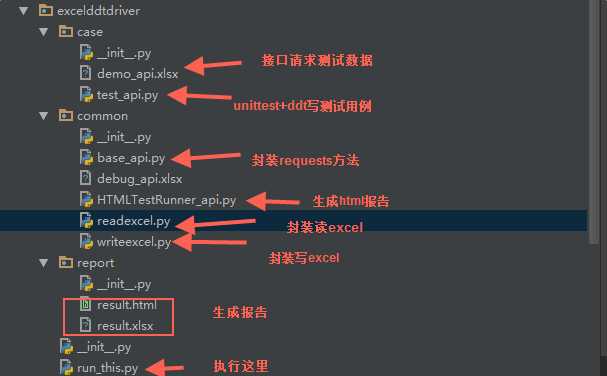
excel测试数据
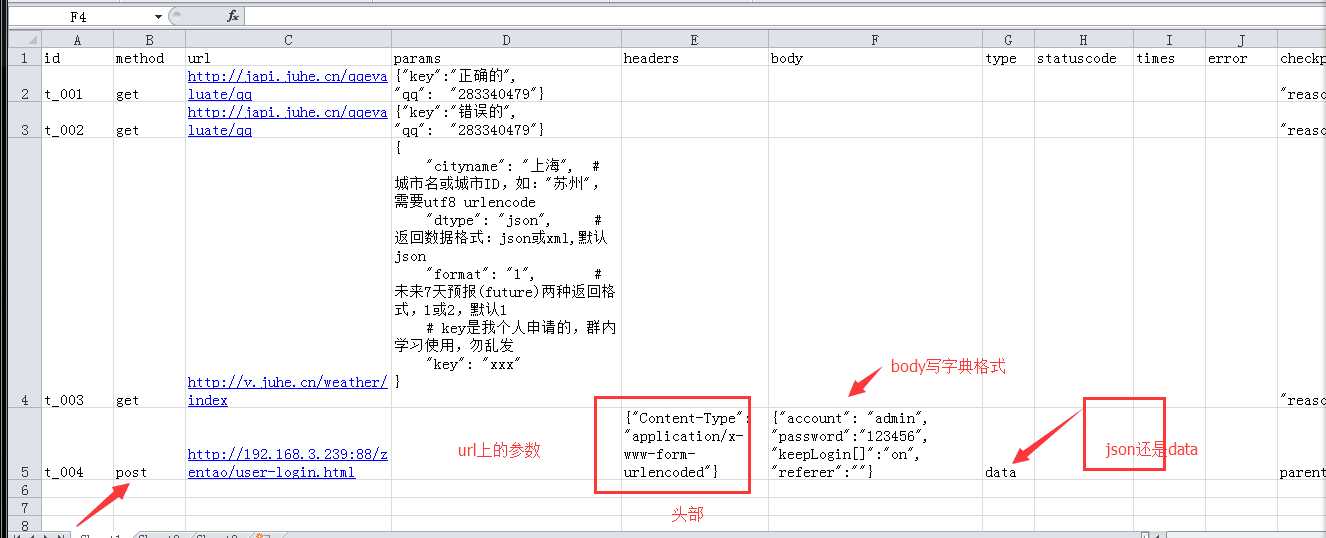
xlrd读excel数据
1.先从excel里面读取测试数据,返回字典格式
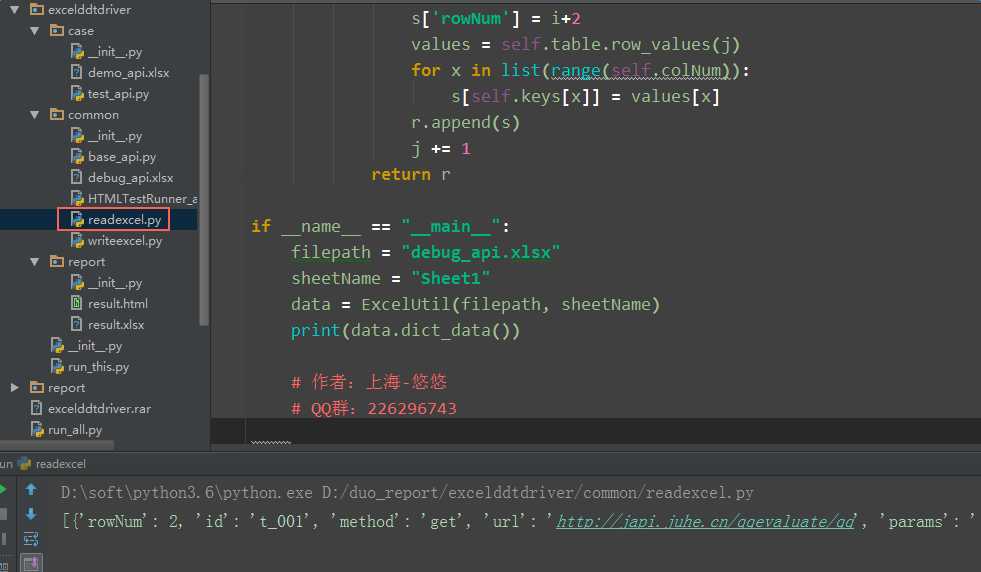
1 # coding:utf-8 2 3 # 作者:上海-悠悠 4 # QQ群:226296743 5 6 import xlrd 7 class ExcelUtil(): 8 def __init__(self, excelPath, sheetName="Sheet1"): 9 self.data = xlrd.open_workbook(excelPath) 10 self.table = self.data.sheet_by_name(sheetName) 11 # 获取第一行作为key值 12 self.keys = self.table.row_values(0) 13 # 获取总行数 14 self.rowNum = self.table.nrows 15 # 获取总列数 16 self.colNum = self.table.ncols 17 18 def dict_data(self): 19 if self.rowNum <= 1: 20 print("总行数小于1") 21 else: 22 r = [] 23 j = 1 24 for i in list(range(self.rowNum-1)): 25 s = {} 26 # 从第二行取对应values值 27 s[‘rowNum‘] = i+2 28 values = self.table.row_values(j) 29 for x in list(range(self.colNum)): 30 s[self.keys[x]] = values[x] 31 r.append(s) 32 j += 1 33 return r 34 35 if __name__ == "__main__": 36 filepath = "debug_api.xlsx" 37 sheetName = "Sheet1" 38 data = ExcelUtil(filepath, sheetName) 39 print(data.dict_data()) 40 openpyxl写入数据 41 42 1.再封装一个写入excel数据的方法 43 44 # coding:utf-8 45 from openpyxl import load_workbook 46 import openpyxl 47 48 # 作者:上海-悠悠 49 # QQ群:226296743 50 51 def copy_excel(excelpath1, excelpath2): 52 ‘‘‘复制excek,把excelpath1数据复制到excelpath2‘‘‘ 53 wb2 = openpyxl.Workbook() 54 wb2.save(excelpath2) 55 # 读取数据 56 wb1 = openpyxl.load_workbook(excelpath1) 57 wb2 = openpyxl.load_workbook(excelpath2) 58 sheets1 = wb1.sheetnames 59 sheets2 = wb2.sheetnames 60 sheet1 = wb1[sheets1[0]] 61 sheet2 = wb2[sheets2[0]] 62 max_row = sheet1.max_row # 最大行数 63 max_column = sheet1.max_column # 最大列数 64 65 for m in list(range(1,max_row+1)): 66 for n in list(range(97,97+max_column)): # chr(97)=‘a‘ 67 n = chr(n) # ASCII字符 68 i =‘%s%d‘% (n, m) # 单元格编号 69 cell1 = sheet1[i].value # 获取data单元格数据 70 sheet2[i].value = cell1 # 赋值到test单元格 71 72 wb2.save(excelpath2) # 保存数据 73 wb1.close() # 关闭excel 74 wb2.close() 75 76 class Write_excel(object): 77 ‘‘‘修改excel数据‘‘‘ 78 def __init__(self, filename): 79 self.filename = filename 80 self.wb = load_workbook(self.filename) 81 self.ws = self.wb.active # 激活sheet 82 83 def write(self, row_n, col_n, value): 84 ‘‘‘写入数据,如(2,3,"hello"),第二行第三列写入数据"hello"‘‘‘ 85 self.ws.cell(row_n, col_n).value = value 86 self.wb.save(self.filename) 87 88 if __name__ == "__main__": 89 copy_excel("debug_api.xlsx", "testreport.xlsx") 90 wt = Write_excel("testreport.xlsx") 91 wt.write(4, 5, "HELLEOP") 92 wt.write(4, 6, "HELLEOP")
封装request请求方法
1.把从excel读处理的数据作为请求参数,封装requests请求方法,传入请求参数,并返回结果
2.为了不污染测试的数据,出报告的时候先将测试的excel复制都应该新的excel
3.把测试返回的结果,在新的excel里面写入数据
1 # coding:utf-8 2 import json 3 import requests 4 from excelddtdriver.common.readexcel import ExcelUtil 5 from excelddtdriver.common.writeexcel import copy_excel, Write_excel 6 7 # 作者:上海-悠悠 8 # QQ群:226296743 9 10 11 def send_requests(s, testdata): 12 ‘‘‘封装requests请求‘‘‘ 13 method = testdata["method"] 14 url = testdata["url"] 15 # url后面的params参数 16 try: 17 params = eval(testdata["params"]) 18 except: 19 params = None 20 # 请求头部headers 21 try: 22 headers = eval(testdata["headers"]) 23 print("请求头部:%s" % headers) 24 except: 25 headers = None 26 # post请求body类型 27 type = testdata["type"] 28 29 test_nub = testdata[‘id‘] 30 print("*******正在执行用例:----- %s ----**********" % test_nub) 31 print("请求方式:%s, 请求url:%s" % (method, url)) 32 print("请求params:%s" % params) 33 34 # post请求body内容 35 try: 36 bodydata = eval(testdata["body"]) 37 except: 38 bodydata = {} 39 40 # 判断传data数据还是json 41 if type == "data": 42 body = bodydata 43 elif type == "json": 44 body = json.dumps(bodydata) 45 else: 46 body = bodydata 47 if method == "post": print("post请求body类型为:%s ,body内容为:%s" % (type, body)) 48 49 verify = False 50 res = {} # 接受返回数据 51 52 try: 53 r = s.request(method=method, 54 url=url, 55 params=params, 56 headers=headers, 57 data=body, 58 verify=verify 59 ) 60 print("页面返回信息:%s" % r.content.decode("utf-8")) 61 res[‘id‘] = testdata[‘id‘] 62 res[‘rowNum‘] = testdata[‘rowNum‘] 63 res["statuscode"] = str(r.status_code) # 状态码转成str 64 res["text"] = r.content.decode("utf-8") 65 res["times"] = str(r.elapsed.total_seconds()) # 接口请求时间转str 66 if res["statuscode"] != "200": 67 res["error"] = res["text"] 68 else: 69 res["error"] = "" 70 res["msg"] = "" 71 if testdata["checkpoint"] in res["text"]: 72 res["result"] = "pass" 73 print("用例测试结果: %s---->%s" % (test_nub, res["result"])) 74 else: 75 res["result"] = "fail" 76 return res 77 except Exception as msg: 78 res["msg"] = str(msg) 79 return res 80 81 def wirte_result(result, filename="result.xlsx"): 82 # 返回结果的行数row_nub 83 row_nub = result[‘rowNum‘] 84 # 写入statuscode 85 wt = Write_excel(filename) 86 wt.write(row_nub, 8, result[‘statuscode‘]) # 写入返回状态码statuscode,第8列 87 wt.write(row_nub, 9, result[‘times‘]) # 耗时 88 wt.write(row_nub, 10, result[‘error‘]) # 状态码非200时的返回信息 89 wt.write(row_nub, 12, result[‘result‘]) # 测试结果 pass 还是fail 90 wt.write(row_nub, 13, result[‘msg‘]) # 抛异常 91 92 if __name__ == "__main__": 93 data = ExcelUtil("debug_api.xlsx").dict_data() 94 print(data[0]) 95 s = requests.session() 96 res = send_requests(s, data[0]) 97 copy_excel("debug_api.xlsx", "result.xlsx") 98 wirte_result(res, filename="result.xlsx")
测试用例unittest+ddt
1.测试用例用unittest框架组建,并用ddt数据驱动模式,批量执行用例
1 # coding:utf-8 2 import unittest 3 import ddt 4 import os 5 import requests 6 from excelddtdriver.common import base_api 7 from excelddtdriver.common import readexcel 8 from excelddtdriver.common import writeexcel 9 10 # 作者:上海-悠悠 11 # QQ群:226296743 12 13 # 获取demo_api.xlsx路径 14 curpath = os.path.dirname(os.path.realpath(__file__)) 15 testxlsx = os.path.join(curpath, "demo_api.xlsx") 16 17 # 复制demo_api.xlsx文件到report下 18 report_path = os.path.join(os.path.dirname(curpath), "report") 19 reportxlsx = os.path.join(report_path, "result.xlsx") 20 21 testdata = readexcel.ExcelUtil(testxlsx).dict_data() 22 @ddt.ddt 23 class Test_api(unittest.TestCase): 24 @classmethod 25 def setUpClass(cls): 26 cls.s = requests.session() 27 # 如果有登录的话,就在这里先登录了 28 writeexcel.copy_excel(testxlsx, reportxlsx) # 复制xlsx 29 30 @ddt.data(*testdata) 31 def test_api(self, data): 32 # 先复制excel数据到report 33 res = base_api.send_requests(self.s, data) 34 35 base_api.wirte_result(res, filename=reportxlsx) 36 # 检查点 checkpoint 37 check = data["checkpoint"] 38 print("检查点->:%s"%check) 39 # 返回结果 40 res_text = res["text"] 41 print("返回实际结果->:%s"%res_text) 42 # 断言 43 self.assertTrue(check in res_text) 44 45 if __name__ == "__main__": 46 unittest.main()
生成报告
1.用HTMLTestRunner生成html报告,我这里改了下名称,改成了HTMLTestRunner_api.py
此文件跟selenium的报告是通用的,github可下载https://github.com/yoyoketang/selenium_report/tree/master/selenium_report
1 # coding=utf-8 2 import unittest 3 import time 4 from excelddtdriver.common import HTMLTestRunner_api 5 import os 6 7 # 作者:上海-悠悠 8 # QQ群:226296743 9 10 curpath = os.path.dirname(os.path.realpath(__file__)) 11 report_path = os.path.join(curpath, "report") 12 if not os.path.exists(report_path): os.mkdir(report_path) 13 case_path = os.path.join(curpath, "case") 14 15 def add_case(casepath=case_path, rule="test*.py"): 16 ‘‘‘加载所有的测试用例‘‘‘ 17 # 定义discover方法的参数 18 discover = unittest.defaultTestLoader.discover(casepath, 19 pattern=rule,) 20 21 return discover 22 23 def run_case(all_case, reportpath=report_path): 24 ‘‘‘执行所有的用例, 并把结果写入测试报告‘‘‘ 25 htmlreport = reportpath+r"\\result.html" 26 print("测试报告生成地址:%s"% htmlreport) 27 fp = open(htmlreport, "wb") 28 runner = HTMLTestRunner_api.H全部折叠 折叠标题: 29 View Code 30 显示行号 行内代码 31 TMLTestRunner(stream=fp, 32 verbosity=2, 33 title="测试报告", 34 description="用例执行情况") 35 36 # 调用add_case函数返回值 37 runner.run(all_case) 38 fp.close() 39 40 if __name__ == "__main__": 41 cases = add_case() 42 run_case(cases)
2.生成的excel报告
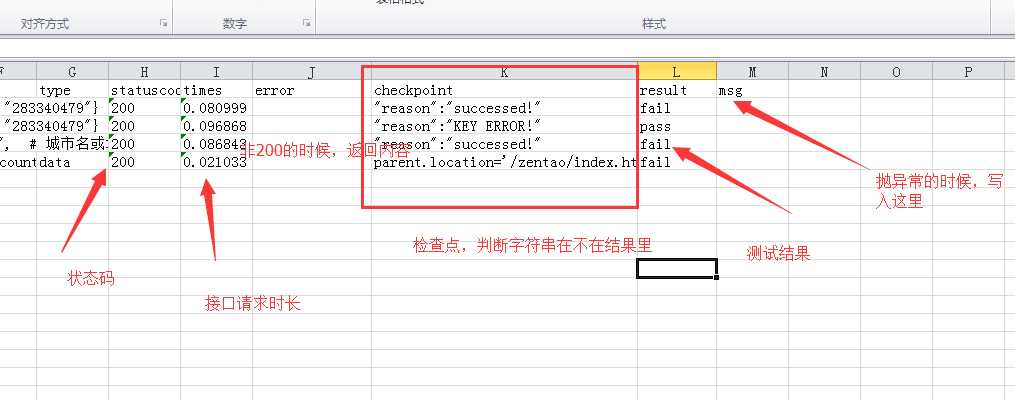
3.生成的html报告
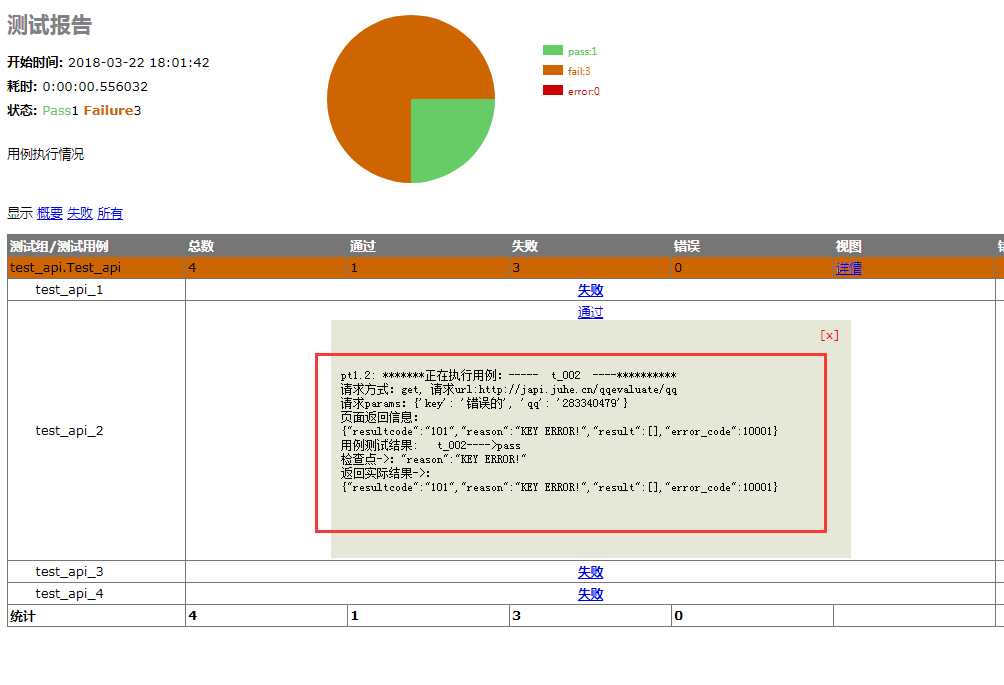
以上是关于python+requests+excel+unittest+ddt接口自动化数据驱动并生成html报告的主要内容,如果未能解决你的问题,请参考以下文章